Rick
Archer's Note:
Here is my article on
the nature of Luck. If you have a thought to share, by all
means contact me. I am always curious to see what people think
of my unusual ideas.
rick@ssqq.com
|
|

CHAPTER ONE
HUNDRED SEVENTY EIGHT:
DUMB LUCK
Written by
Rick Archer
|
|
SUBCHAPTER 768
-
OBSERVATION 81
|
Rick Archer's Note:
This
chapter is a meditation on Luck. Good
Luck, Bad Luck, and Dumb Luck. Samuel
Goldwyn, the movie mogul of MGM, is credited with saying, "The harder I
work, the Luckier I get."
Goldwyn
later clarified that statement.
"I
think Luck is the sense to recognize an
opportunity and the ability to take advantage of
it. Everyone has bad breaks, but everyone also has opportunities. The man who can smile at his bad breaks and grab
his chances gets on."
Despite
experiencing my fair share of Bad Luck... putting
my left eye out with a knife... I consider
myself an extremely lucky person. In
particular, I have been
extremely lucky when it
has come to my dance career.
As one
might gather, I am convinced that 'Luck' and
'Fate' are intertwined.
So what
is Dumb Luck? Dumb Luck occurs when someone
succeeds despite colossal stupidity.
How many times
have I said I somehow succeeded in spite of myself?
I wish I
could say it was my Talent that was responsible for
my success, but only to a certain degree. In
my heart I know that without the unusual amount of good
fortune I was blessed with, I am skeptical I
could have accomplished the things I did.
|
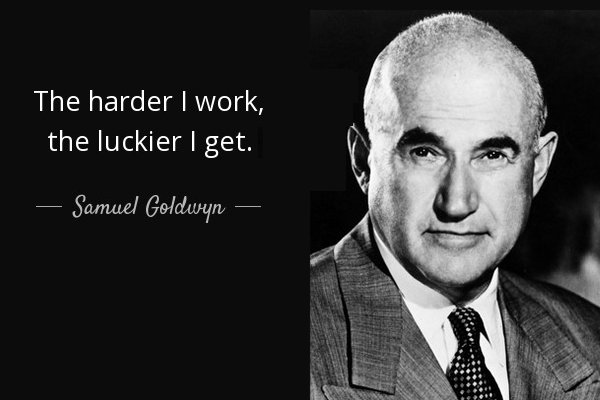 |
 |
First
let's talk about Good Luck. Here at
the start of 1980, a series of remarkable events had placed me at the center of the
Country Crossroad.
In an eerie replay of Saturday Night
Fever, I
was standing directly in the path of a vast social
phenomenon
for the second time in my life.
Although
lightning had just struck twice for me, there was
one major difference.
The dance energy of
Saturday Night Fever swept America
off its feet.
The dance energy of Urban
Cowboy was limited to one spot:
Houston, Texas.
|
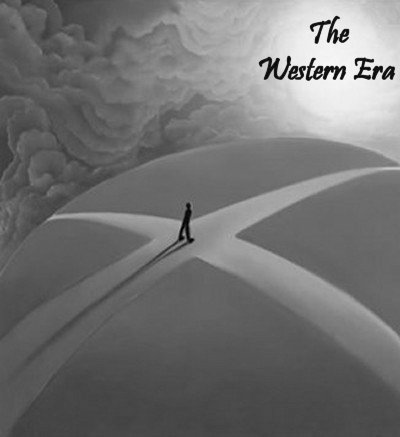 |
I could
not help but notice the striking parallel between my Disco situation and
my Western situation. Back when
Saturday Night Fever hit in January 1978, my Disco
Listing in the adult
education magazine Courses
a la Carte was the equivalent of having skywriting over
Houston which said, "Take Disco lessons at Stevens of Hollywood."
When January 1980 arrived, my
Western Listing in Class Factory was the equivalent of
having skywriting over Houston which said, "Take
Country-Western
lessons at Stevens of Hollywood."
This
fortuitous development would funnel countless Western students to the
dance studio in January 1980. Stevens of
Hollywood magically became Ground Zero for students to take
western dance
lessons and I was prepared to handle the
energy.
It was
absolutely uncanny how much my Disco story and Western story
have in common. I was the
leader in this particular race for the simple reason that no
one was chasing me. In a
city of over one million, I stood alone. Hmm, haven't we
heard that phrase before?
Once again I
was in the Right Place at the Right time. To me,
the odds of me becoming Houston's first well-known
Western dance teacher were so remote there was no
doubt in my mind the Country
Crossroad was yet another
Supernatural Situation.
I doubt seriously I was the
only Western teacher in Houston when the newest
Tidal Wave hit. There had to be other teachers
somewhere, but I never heard of one. Thanks to the
Class Factory Spotlight and my mailing list
of former Disco students, I was the only teacher anyone
seemed to know about for the first four months of
1980.
One might recall I
said the same thing about Disco in 1978. Yes, indeed,
lightning had
struck twice in the same spot. I was the only
Western teacher in a city of one million.
And what were the
odds? A million to one sounds about right.
What were the
odds of being both Houston's best known Disco teacher AND
Houston's best known Western teacher? I would peg the combined odds as
beyond astronomical.
|
 |
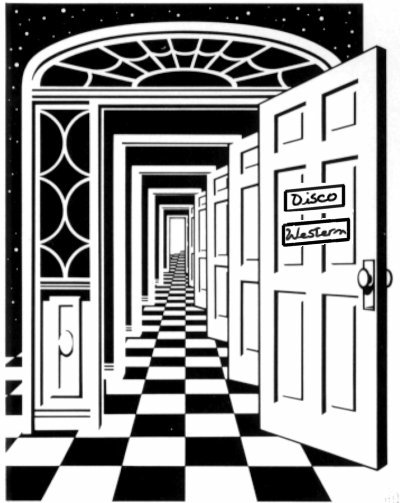 |
Someone might
make a case that my notoriety as a Disco teacher would elevate
me to a similar role in Western. To a small extent, that did
play a role. However, these were the days before the
Internet. There was little citywide publicity about me.
I had no listing in the Yellow Pages. I had no
advertising. As
before, I was an obscure dance teacher that most people had
never heard of. In this case, it was my listing in
Class Factory that did the trick just as Courses a
la Carte had previously done for Disco.
One of the strange
aspects about my new situation was my lack of awareness that
something special was unfolding before me. I had no idea
what was going on until Fright Night opened my
eyes. This had
happened with Disco as well. When the Disco Door
opened, I realized I had spent the past three years
'accidentally' preparing to handle the most important
opportunity of my life. Once I stumbled through the
Disco Door, I realized I was just barely prepared to handle the
situation. At that point, I had to scramble like mad
to handle all the obstacles.
Now
as the Western Door opened, I realized I had spent the
Autumn months of 1979 'accidentally' preparing to handle an opportunity
that could potentially be just as important.
As we shall see, once I stumbled through this door, I
quickly realized I was ill-prepared to handle
the new situation. I would have to
scramble like mad to handle the Western energy
about to hit Houston.
The two situations were so
identical it was downright freaky. But I wasn't
complaining.
Now that I had hitched a second ride on the comet tail
of John Travolta's star power, my Magic Carpet Ride
was about to soar anew.
|
At the
tail end of the Year of Living Dangerously,
I had a lot of time to think. I was very
grateful to realize my dance career had been given a
new lease on life. However, the circumstances
were so bizarre that I was absolutely certain that
'Fate' had intervened yet again. No other explanation
could satisfy me.
I have
to be honest, this strange turn of events struck me as
totally wrong. Let's face it, I never
bargained for this. Yes, I had prayed for something
special to happen with Disco, but I had resisted the coming
of the Western Era with
every ounce of my being. And yet without any
knowledge on my part that I was preparing for
something important, my risky Meyerland
and Fright Night gambles had given me
a remarkable head start here in January 1980.
Fright Night
hit me like a ton of bricks. So now I am
going
to be a Western
dance teacher? Come on, this is ridiculous!!!
Of all the people in Houston, I had no business
being a Western teacher, much less the ONLY ONE.
How could this have happened? To me, this must
mean I
had been given a special role to play.
Over the
years, my belief in Fate had developed gradually.
The unusual parking lot meeting with Mrs. Ballantyne
in high school was the event that first opened my
eyes. Then came my Magical Mystery Tour
during college. My research during this period included the
Edgar Cayce books and Autobiography of a Yogi. Both sources strongly indicated
that 'Fate' played a role in our lives.
It is one thing to read about Fate and mull things
over theoretically. However, it is entirely
different to actually experience events which suggest
the intervention of Fate.
Back in
1977 when I received a series of breaks necessary to become Houston's first Disco teacher, I was
98% convinced that Fate had been involved. To see
it happen again with Country-Western dancing, I upgraded my certainty to 100%.
I could
not get my mind off the Arabic saying that claimed
what is Destined will reach you even if it lays
underneath two mountains. Who could deny that
Fate and Fortune had moved a mountain to turn me
into a Disco teacher? Now Fate and Fortune had
moved a second mountain to make
me a Western teacher.
Not just that, but the weirdest part was my
realization that Fate had moved the second mountain
while I remained totally unaware of what was going on.
To me, I felt like my Western opportunity was an
accident, a fluke. Or to be more blunt, it was
pure Dumb Luck. I did not seek this job.
This job was handed to me.
|
 |
Throughout the Disco Era, I nursed a growing
hunch that I was leading a charmed life.
However, it was not until Fright Night
that I truly 'got it'. There were
so many lucky breaks surrounding Fright
Night that I was certain these events
were no mistake. I had to be leading
a charmed life to escape the jam I was in.
Filled with goosebumps, I took a deep breath to
steady myself. I had no idea what I had
done to deserve such special treatment. Was I proud of myself? Yes and no.
Of course I felt satisfaction that I had been
assigned a mission of some sort. However,
at the same time I was truly humbled by the fact
that I did not know what I had done to merit
such an honor. If I had displayed oodles
of Talent up to this point, it might have made
more sense. However, as my story has made
clear, my voyage to this point had been marked
more by stumbling mediocrity and a succession of
lucky breaks than any real ability.
Why was I so lucky all the time? Or why
wasn't I smarter to recognize the potential here
to begin with? Yes, I had received an
amazing stroke of fortune, but in my heart I did
not deserve a lick of credit. The way I
felt about it, God was looking around one day
and spotted me. "Hey, you over there, I
have a job for you." Who, me?
Seriously, it was hard to feel proud of myself.
It was not like I had worked my ass off to get
to this place. After all, this new Western assignment had simply
been handed to me whether I wanted it or not.
All I knew was one thing: I did not know what my role would be, but there
was no doubt in my mind I had been
selected for something.
I was
crestfallen to admit I had behaved like an idiot
regarding the potential of C&W dancing.
During the Western Transformation of Spring 1979, I
had all the information I needed to realize that
Western would one day replace Disco. So why
didn't I simply accept the inevitable and start
visiting the Western clubs immediately? But
no, not me. That would have made too much sense.
Rather than take the obvious step to at least
investigate what was going on, I stuck my head
in the sand and refused to prepare for the
coming onslaught like I should
have. Avoiding
Houston's Western clubs like the plague, I vowed that I would 'Never'
teach Country-Western dance. As they say,
Never say Never. Then suddenly more or
less against my will, I found myself preparing
for the Meyerland Club western
class.
Here
is my point. If I had a brain... and we
know that I don't... I would have prepared
for Western throughout the summer of 1979 at a
leisurely pace. By avoiding the obvious
value of visiting the Western clubs in a timely
fashion, I was forced to scramble like mad at
the last moment to get ready, making one mistake
after another in the process.
This
situation is a perfect example of Dumb Luck.
This
was not Thomas Edison painstakingly trying 1,000
different experiments in search of the perfect
light bulb, this was Rick Archer trying to fake
his way through the Meyerland Western class with
as little effort and commitment as humanly
possible. But look how it paid off!
Thanks to my Dumb Luck, here
in
January 1980, I was prepared to
teach Western at the exact moment the new
phenomenon was ready to break wide
open. My timing was perfect. But it
wasn't 'my timing', was it? The timing of
the Universe was perfect.
Sure I was lucky. But I was
also Stupid! Previously I had explored the
possibility of the existence of 'Cosmic
Stupidity'. Now I began to wonder if there
was a corollary phenomenon known as 'Dumb
Luck'. To me, 'Dumb Luck' was a
situation where something
wonderful happens without foresight or merit.
Yes, I
deserved to get a scholarship to college.
I worked for it. Yes, I deserved to become a Disco teacher.
I worked three years for it. But I
did NOT deserve to become a Western teacher.
'Dumb Luck'
not only implies the
person did little to deserve it, he may even do
something to sabotage any chance of success.
Take me for example. I was so
dumb, I wandered around blind throughout 1979.
I was the last person in Houston to realize
that Cowboy was a palace, not a dump.
This was something I should have figured out
for myself, yet I had been totally blind. Then came the Ides of Waltz which was
the direct result of my stupid decision to teach
a dance class blind. I had no business surviving
Fright Night, but three
last-second 'nick
of time' ideas somehow bailed me out. My
embarrassment increased the following day.
My move
to get a western class listing
inserted into Class Factory for
January was a critical last-minute decision.
Had I waited a moment longer, no doubt Deborah
would have relentlessly worked the phones until
she found some Texas A&M western dancer willing to
teach the January class instead of me. I
got in just under the wire. If that
wasn't 'Dumb Luck', then what was it?
Kicking myself hard for my negligence, I
doubted it was possible for anyone to be
dumber than me. But here is what is
interesting. In the process of writing
my book, I came to realize there were others guilty of misjudgment just as
great as mine. Take this possibility as an example.
When
Cowboy opened in February 1979, rumor
has it the club did very good business.
I would not know first-hand because I waited
nine months till my students forced me to go look for myself. Real
bright, huh?
In
fact, the business at Cowboy was so good in fact that it inspired
dozens of copycat moves throughout Houston. The
best dancers were the Texas Aggies who had
learned Polka and Twostep while they were in
college. Indeed, Houston had several
thousand A&M graduates floating around with
knowledge of Western dancing. These Aggies
danced in the Western clubs throughout
1979.
So
let me ask a question. Over the course of
twelve
months, WHY DIDN'T ANY OF THESE AGGIES THINK TO
TEACH WESTERN DANCING? I am not saying that
Texas Aggies are dumb or stupid. I am
simply saying that here were men and women who
already loved Western dancing, had plenty of
experience, and had a college degree to boot.
Every time one of these Aggies went dancing at
Cowboy or someplace similar,
surely they noticed someone stumbling around
trying to figure out the secrets of the Polka
and Twostep. What kept these experienced
dancers from recognizing the obvious need for a
Western teacher?
I
had always thought the best example for large
scale stupidity was the idiot Trojans who
dragged that big wooden horse inside their
walls. But this situation where the Aggies
turned a blind eye to the business potential in
teaching Western dance was equally perplexing.
Even more perplexing was seeing a
Country-Western Heretic like myself, a known
bigot who despised the music and made fun of the
dancing,
become Houston's first western teacher instead?
On the surface, it does not make a bit of sense.
The
total lack of Western teachers is not the only
weird example of Dumb Luck. During my
research for this book, I uncovered a little
known story involving
Urban Cowboy that serves as the most
glaring example of Dumb Luck I have ever come
across. Put your seat belts on, this is
the all-time winner of the
Dumb Luck Award for success in spite of oneself.
|
|
SUBCHAPTER 612
-
ROBERT STIGWOOD'S
GOOD LUCK
|
Rick Archer's Note:
As I tell my
tale of Dumb Luck, please be patient. Just
follow the bouncing ball and enjoy the ride. I
will start my story with our old friend Robert
Stigwood.
They always say that when you're hot, you're hot.
When it came to Saturday Night
Fever, Producer Robert Stigwood was hot.
He had the
greatest run of Good Luck I have ever witnessed.
Everything he touched turned to gold.
I could not
escape the feeling that Stigwood was the
Luckiest guy of all time.
Everything broke right for him... Nik the Slick's
Disco story which appeared out of thin air, the
stratospheric talent of John Travolta, the genius
script writer Norman Wexler, the brilliant Bee Gees
music added at the last minute.
Indeed,
everyone who touched Saturday Night Fever
was at the top of their game. The way Fever worked out so perfectly defies
the imagination. In fact, so many things clicked, one
might believe Robert Stigwood had the Wheel of Fortune spinning in his direction
and brought everyone else along for the ride.
Anyone who reads
the story
of Robert Stigwood's success might
conclude he was brilliant. Good grief, the man
achieved a $400 million return on an investment of $3.5
million. Not just that, the phenomenal success of
Grease further burnished Stigwood's
reputation as a genius.
|
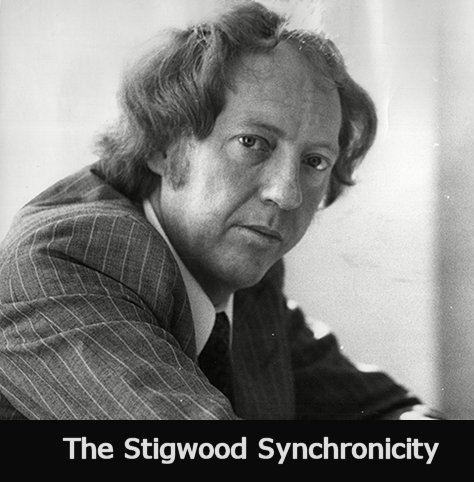 |
SUBCHAPTER 613
- ROBERT STIGWOOD'S
BAD LUCK
|
One might
conclude that Stigwood was brilliant beyond
brilliant.
But guess what?
Not necessarily so!
On Stigwood's next three
projects, he failed miserably. Have you ever heard of a movie titled Sgt. Pepper's
Lonely Hearts Club Band? Probably not.
This Stigwood production is widely considered one of the
worst movies ever made.
In 1978, the Bee Gees and
singer Peter Frampton had reached mega-stardom. They
sold millions of records, had their faces plastered on
magazine covers and played sold-out concerts to venues
across the globe. Casting the Bee
Gees and Frampton as stars of the movie had seemed like
a sure winner. What better way to sell countless
billions of records?
But then this awful movie came along and made them a
laughing stock. This look at
the reviews gives a clear picture.
•
"the film is
humorless"
•
"a film with a
dangerous resemblance to wallpaper"
•
"ranges from barely
tolerable to embarrassing"
•
"it just doesn't
work"
•
"quite possibly the
silliest movie ever conceived"
•
"mind-bogglingly
awful"
|
 |
Nor did Stigwood's run of bad luck stop there. Soon
after, Robert
Stigwood produced two other truly awful movies, both of
which starred John
Travolta. One was the ill-fated movie
Staying Alive in 1983. The funniest part
was the huge dance scene with Travolta looking more like
Tarzan than a dancer.
Roger Ebert had this to
say:
"Staying Alive" is a big disappointment. This Sequel to the
gutsy, electric "Saturday Night Fever" is a slick,
commercial cinematic jukebox.
The movie was co-authored and directed by Sylvester
Stallone, and is the first bad movie he's made.
Stallone remembers
all the moves from his Rocky plots, but he leaves out the
heart -- and, even worse, he leaves out the characters. Everybody in "Staying Alive" is a cliché. Their lives are clichés and God knows their
dialogue is cliché.
The big musical climaxes are
interrupted only long enough for people to shout prepackaged
emotional countercharges at each other. There is little
attempt to approximate recognized human speech.
Stallone makes little effort to convince us we're watching a
real stage presentation; there are camera effects the
audience could never see, montages that create impossible
physical moves and -- most inexplicable of all -- a vocal
soundtrack even though nobody on stage is singing. It's a mess.
Travolta's big dance number looks like a high-tech TV auto
commercial that got sick to its stomach."
|
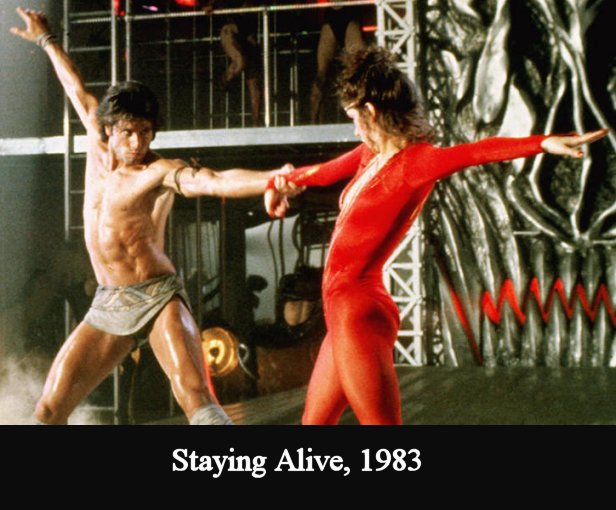 |
SUBCHAPTER 614
- TALENT VERSUS LUCK
|
His failures
aside, Robert Stigwood was considered a genius. To begin
with, Stigwood was the man who saw something special in Travolta.
Despite criticism, he signed Travolta to a million dollar contract at a
time when the lad was still an unproven talent.
Travolta had
auditioned for the lead in Stigwood's Jesus
Christ Superstar back in 1969.
Stigwood was so impressed, he tried as hard as he
could to look past the fact that Travolta was only 16.
But he could not get past the age problem, so instead Stigwood
underlined the lad's name and held onto the memory.
Seven years later Stigwood's original hunch
was reinforced by Travolta's TV success in
Welcome Back, Kotter. Believing the
young man had oodles of Star Power, Stigwood
signed Travolta to a million dollar, three-movie contract.
Stigwood's main purpose was to give the starring
role in Grease to Travolta.
However, Stigwood was surprised when he learned that
the rights to film Grease would have
to wait another two years. That is when Stigwood
noticed the script to Saturday Night Fever
laying on his desk. Hmm, why not put Travolta
in a Disco movie and get the Bee Gees involved?
One year after
Fever,
Travolta went on to star in Grease,
thereby making him the biggest name in Hollywood.
Give Stigwood
the credit he deserves for betting the farm on Travolta.
In addition, Stigwood recognized the value of Nik the
Slick's Disco story that appeared in Clay Felker's New
York Magazine. When Nik the Slick raised the
price from $10,000 to $150,000, Stigwood paid it anyway over
the objections of his lawyer. Stigwood said, "This
movie could be worth a hundred million dollars. I'm going to
pay the kid whatever he wants."
And you know
what? Stigwood was right! Not only that, he was
spectacularly right. The movie made $400 million
dollars!
But then
Stigwood turned around and made the TWO WORST MOVIES of all
time! According to the website Creative Loafing,
Sgt. Pepper's
Lonely Hearts Club Band
and
Staying Alive are listed Number One and Number
Two as the worst movies ever.
Thanks
Robert Stigwood, we have a
state of extreme conflict. Was Robert
Stigwood a genius or was he merely Dumb Lucky?
Nor
does the list stop there. Were the Bee
Gees as good as advertised or was their Saturday Night
Fever music a once in a lifetime fluke? Their
music not only bombed in
Sgt. Pepper's
Lonely Hearts Club Band,
it bombed again in
Staying Alive.
Sylvester
Stallone not only acted in Rocky, he wrote the
brilliant script. But his handling of Staying
Alive bordered on pathetic.
What about John?
Welcome Back Kotter, Grease,
Saturday Night Fever. In the world of
entertainment, John Travolta's Talent made him the
undisputed Icon of the Seventies. And yet after
Grease, Travolta made two of the worst movies of
all-time. The first will remain a mystery for the time
being and the other was Staying Alive.
Whatever happened to all that Talent?
|
 |
Time and again,
we have stories of geniuses who fail. Not only do they
fail, sometimes they fail in spectacular fashion. The all-time poster boy for the Genius Who Failed was
Napoleon. His decision to
invade Russia proved to be a colossal mistake.
As we
recall, Napoleon laid waste to Europe. Winning
battle after battle against the best generals on the
continent, Napoleon had genius, experience, plus an
unbeatable army of half a million soldiers. He was
going up against a ragtag Russian army full of untrained
farmers who used pitchforks for weapons. Not exactly a
fair fight, yet Napoleon lost.
The Russian army
pursued a cat and mouse Scorched Earth strategy. Every
time Napoleon got close, the Russians retreated and burned
their crops in the process. Guess who died?
Napoleon's men? No. They had dwindling supplies
from home. It was the Russian peasants
who were left with no food. Refusing to see the danger
he faced, Napoleon chased the Russians all the way to
Moscow. He knew there was plenty of food in Moscow. So
what did the Russians do?
They burned
Moscow to the ground. No more food. Checkmate.
|
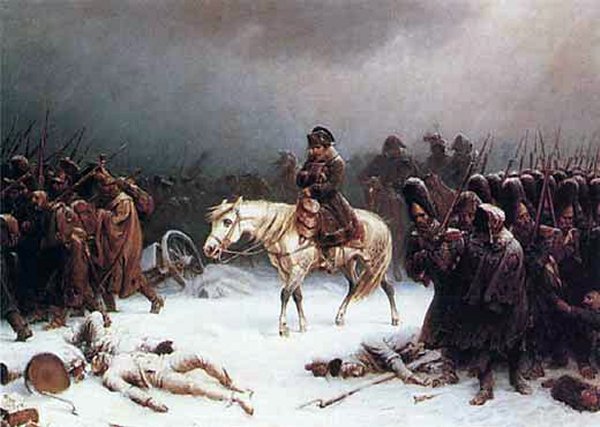 |
And what is my
point? When geniuses fail, I ask myself if perhaps
there might be a Supernatural explanation. It seems to
me that Napoleon should have seen the danger he was facing.
How could a man as smart as Napoleon allow his entire army
to get trapped?
Here is the way
I see it. Robert Stigwood had talent. No one can
deny that. So did the Bee Gees, Sylvester Stallone,
and John Travolta. And yet they all experienced
spectacular failure in situations where they should have
succeeded. How can John Travolta possibly fail in his
Staying Alive sequel to Saturday Night
Fever? The anticipation for this movie was
incredible; it should have worked. Did I mention the
writer for Staying Alive was Norman Wexler?
Wexler was the man who wrote the brilliant script for
Saturday Night Fever. How can a man with
Wexler's writing ability come up with such a worthless plot
for Staying Alive? The list goes on.
|
Let me add that
I too have failed in situations where I was certain of
success. The best example was the time I failed in my
'Dance Curse' situations seven times in a row.
Yes, there was a sixth and seventh incident. I will
save the details for later, but I will share my conclusion
now. These were situations where by all rights I
should have succeeded, but came up short. Each time I
failed, I failed due to circumstances out of my control.
No matter how much preparation, no matter how much
foresight, something always went wrong. That led me to
conclude that all the Talent in the world is meaningless
unless Destiny approves the outcome.
Let us return to
the Arabic saying about God moving two mountains if it is
meant to be. Did you know there is a corollary?
The entire phrase says this:
“What
is meant for you will reach you even if it is beneath
two mountains,
... and what is not meant for you will not reach you
even if it is between your two lips.”
In other words,
even if Victory is so close you can taste it, you will
always lose if that is what your Fate dictates. As for Napoleon, my guess is that he reached a similar
conclusion. In letter to Abbé du Pradt regarding his
painful retreat in the snow from Moscow, Napoleon exclaimed,
"From the sublime to the ridiculous is but a step."
Napoleon later
added, "All great events hang by a hair. I believe
in Luck, and the wise man neglects nothing which contributes
to his Destiny."
|
 |
In other words,
a wise man should do everything in his mortal power to
succeed, but the outcome will still be left to Fate.
Napoleon spoke
of Luck several times. Back when
Bonaparte was criticized for winning battles simply
because of Luck, he retorted: “I would rather have
lucky generals than good ones.”
In other words,
Napoleon believed in Talent, but he knew that Talent without
Luck would never succeed. I agree with that.
When we get the
good breaks, everyone comments on how smart we are.
But when we have a mysterious downfall, suddenly we don't
look so smart anymore. I firmly believe that sometimes
it is more important to be Lucky than Good.
|
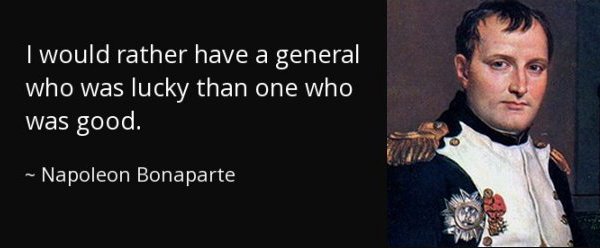 |
SUBCHAPTER 615 -
BAD LUCK
OVERWHELMS TALENT
|
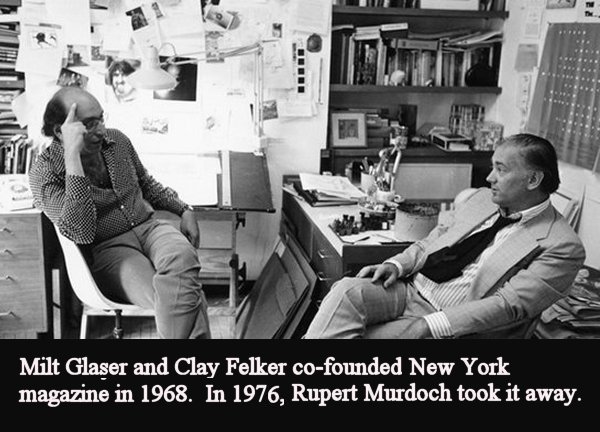 |
Rick Archer's Note:
Clay
Felker, genius or idiot? As they say, when you're
hot, you're hot. But when you're not,
you're not.
In
1976, Clay Felker, editor of New York
magazine, was Not Hot. First Felker let a
street hustler named Nik Cohn con him into
placing a fake Disco story in his magazine.
Of all the people involved in Saturday
Night Fever, Clay Felker was the only
one who failed to make a dime.
Then
Felker got
badly out-maneuvered by Rupert Murdoch for
control of his magazine. Out
of a job with his reputation badly tarnished,
one can imagine Felker craved to
get back in the game. He was down, but not
out.
First Felker purchased
Esquire Magazine in 1977. His next move was to find a way to use the
Saturday Night Fever nightmare to his
own advantage. That prayer was answered
the night he arrived at Gilley's
doorstep. From there, Felker staged his
comeback. Yes, even geniuses fail, but the
smart ones have the sense to get back up and try
again.
|
SUBCHAPTER 616 -
TALENT OVERCOMES
BAD LUCK
|
Rick Archer's Note:
Of
course, I never knew any of these
behind-the-scenes events back in 1979. I
speculated on the identity of the Wizard of Oz
responsible for these dramatic changes in Houston,
but got nowhere. It was not until 2016
that I finally had my answer. The
time had come to write my book, so I began poking my
nose around the Internet to
look for background information. I started with
Saturday Night Fever
and kept digging.
One day I
ran across a fascinating article in Texas
Monthly magazine titled 'Urban Cowboy
Turns 35'. Written
by John Spong, the article consisted of follow-up interviews
with many of the key people associated with the
movie.
|
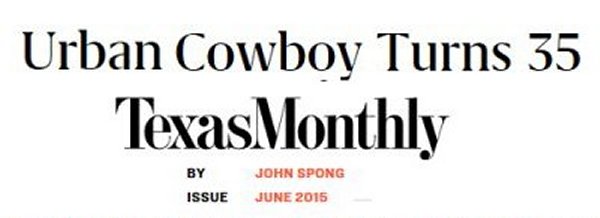 |
Spong began his article by retelling
the story of how Clay Felker discovered Gilley's during his
June 1978 trip to Houston. Here is what
William Broyles Jr., editor of Texas
Monthly, had to say:
"I took Felker to Gilley’s. I’d
hung out there multiple times, and it was so
much a part of the world I was from that I
didn’t see it as a story, whereas Clay saw these
people coming in from the country with their
cowboy cultural map still in their head. That’s
why we drive pickups in River Oaks, right?
So we walk through acres of parking lot, past a
fistfight or two, and as we got closer, we could
hear the sound of it. Once we got inside, it
assaulted us: men hitting the punching bag,
two-stepping, hundreds of them gathered at the
bar, and over in the corner the giant mechanical bull.
Clay had no business being there. He was
in his New York suit and handmade English shoes.
However, the moment Clay saw four thousand
people dressed up like cowboys with the
mechanical bull and
punching bags, he could hardly contain his
excitement. His eyes got really
wide. I thought to myself, 'Boy, this
Felker guy really loves
this place!'"
|
Keeping
his revelation a secret, that night Felker
wasted no time calling his writer friend Aaron Latham. Latham
was told to drop everything and write an article
similar to the one that had created the Saturday Night
Fever sensation.
Aaron
Latham flew to Houston and visited
Gilley's daily for a month. Latham
was not terribly creative. He more or less
copied Nik the Slick's theme about restless youth
using dance to achieve respect among their peers,
then put boots on it. Just to show the story
was not a complete rip-off, Latham added a mechanical bull
and handed it to Clay Felker.
Felker
published
Latham's
Urban Cowboy
article in
the September 1978 issue of Esquire Magazine.
Then
Felker went about using his extensive media contacts to shop the
article as the script for a movie. Aaron Latham said
100 people were chasing this script. After a
spirited bidding
contest, a man named Irving Azoff paid an astounding
$200,000 for the film rights.
So was
Clay Felker's move an example of Talent or Dumb
Luck? I say Talent. Clay Felker was the
Wizard of Oz. Only Clay Felker could have seen a
dump like Gilley's and visualized a
Gold Mine. On the other hand, it took a
certain amount of Luck to run across Gilley's
in the first place.
But then
what exactly is 'Luck'?
"I
think Luck is the sense to recognize an opportunity
and have the ability to take advantage of it.
Everyone has bad breaks, but everyone also has
opportunities. The man who can smile at his bad breaks and grab
his chances is the one who gets on."
-- Samuel Goldwyn
|
 |
SUBCHAPTER 617 -
WHO NEEDS LUCK
WHEN YOU HAVE TALENT?
|
|
So who was
Irving Azoff? Azoff was the man who personally changed the direction of country music.
He started with the Eagles. Under Azoff's tutelage, the Eagles became the
best-selling band in United States history during the
Seventies.
In 1998 the Eagles
were inducted into the Rock and Roll Hall of Fame. Don
Henley immediately pointed to Azoff in the audience and said, "Without Irving, we wouldn't be
standing here
today!"
Glenn Frey,
standing next
to Henley on stage, quipped, "Well, Don, we might have
made it here on our own, but we wouldn't have made nearly as much
money."
Henley laughed,
then added, “You're right, Glenn. Irving may be Satan, but he’s our Satan!”
The Eagles were
unanimous. They knew their big break was getting Azoff to manage them. One can imagine Irving Azoff said the same
thing about the Eagles. Irving Azoff was
the same age as the members of the band. Considering them his
buddies in addition to his clients, Azoff felt a fierce
loyalty.
Thanks in
large part to the Eagle's success during the
Seventies, Azoff had the money necessary to
win the 1978 bidding contest for Urban Cowboy.
Azoff put up the big bucks because he knew a rare opportunity had
just crossed his path.
Even before
Urban Cowboy, Irving Azoff had already noticed a
new trend taking place in country music. While
Saturday Night Fever Disco tunes dominated the
airwaves in 1978, Azoff sensed a potential revolution in
country music. An emerging sound best described as 'Country Rock'
was going head to head with the hard-edged
Willie and Waylon 'Outlaw' music.
First came the
Byrds, then Crosby, Stills,
Nash, and Young. They were the forerunners.
After that, artists such as Neil Young, Pure Prairie League,
Creedence Clearwater and
the Grateful Dead tied their fortunes to 'Country
Rock' in the
Seventies. However, no one dared
whisper that these so-called rock bands were actually playing country
music. That was a taboo subject.
Consequently
I had no idea I was
listening to covert country music. Considering how
prejudiced I was against Country music, it was probably just
as well I did not know some of my favorite music was tainted
by Country. Songs
like Neil Young's Heart
of Gold, Bob Dylan's Lay Lady Lay and
Pure Prairie League's Amie, came
dangerously close to crossing the forbidden line.
A foremost
trailblazer was John Denver. The winds of change were
apparent at the 1975 CMA Awards. This was the year
John Denver beat out Loretta Lynn, Waylon Jennings, Ronnie
Milsap, and Conway Twitty as the Country Music Association 'Entertainer
of the Year'. The presenter, Charlie Rich, was so
disgusted he burned the piece of paper announcing Denver as
the winner on the stage. Right or wrong, the incident
was seen as a protest in defense of traditional country
music against pop usurpers.
The Eagles were
leading pioneers in
the formation of this new
'Country Rock'
style of country music.
With songs like
Peaceful Easy Feeling, the Eagles crafted a
sound that synthesized elements of country music
and rock. The Eagles were gifted song writers.
Indeed, many of their songs told a complex story.
As opposed to Disco music and Rock music with their inane,
repetitive lyrics, the Eagles found that country-style
ballads such as Lyin' Eyes and Tequila Sunrise
worked better to country music formats.
Meanwhile, the
Eagles were still rockers at heart. They found a way to make
country-style vocal harmonies blend to a rock beat in songs
like Bitter Creek and Outlaw Man.
Their music found a wide, appreciative
audience. On a personal note, the Eagles were my favorite rock band
of the Seventies. Although Desperado,
the Eagles' second album, was at best a so-so commercial success in
1973, I adored this album.
Little did I know the deliberate Western theme of Desperado was paving
the way for a music revolution.
Irving Azoff was an entertainment
genius who parlayed his triumph with the Eagles into
managing a veritable Who's Who list of American recording
artists during the '70s. However, he made it clear the
Eagles were closest to his heart. Azoff was to
the Eagles as Robert Stigwood was to the Bee Gees.
Although Azoff was disgusted with Disco music, he could not help
but notice Stigwood's success with the Bee Gees. Now
Azoff was prepared to do the
same for the Eagles and his other clients.
Azoff
believed that Disco music would soon run its course. By
securing the rights to Urban Cowboy, Azoff bet the farm he could do for the Eagles what Stigwood had done
for the Bee Gees. This
bold,
strategic move came at the perfect time in Azoff's
spectacular career. The soundtrack for Saturday Night Fever
had
brought in millions. Why not give Country music a
chance to show what it could do?
Azoff knew what he was doing.
Having witnessed
first-hand the widespread acceptance of the emerging California sound...
Jackson Browne, the Eagles, Linda Ronstadt... it was Azoff's
good fortune that Urban Cowboy came along at
just the right time.
Urban Cowboy was the opportunity Azoff needed to take this
country rock sound to the next level.
It was a shrewd
gamble. Azoff's experience in the music business
convinced him
Urban Cowboy would greatly benefit the Eagles and
his other acts as well.
First Azoff packed his
Urban Cowboy
soundtrack with many
of his own artists such as Boz Scaggs, Dan Fogelberg, Jimmy
Buffett, Linda Ronstadt and of
course the Eagles. Then Azoff took a page from Robert Stigwood
and released the album well
in advance of the movie.
Immediately there were howls
of protest. Where's Willie Nelson? Where's
Waylon Jennings? The answer should have been
obvious... Irving Azoff was deliberately steering the
direction of country music towards the new California sound.
Azoff did not
stop there. Following the
Stigwood playbook to the letter, Azoff understood the movie could
impact the way people dressed, danced, and
listened. The potential
for tie-ins was phenomenal. There is ample
circumstantial evidence to suggest Irving Azoff and Clay Felker
contacted the fashion industry.
What other explanation
could there be for the Western fashions that flooded Houston
well over a year in advance of the debut?
In addition, Clay Felker and
Irving Azoff passed on the secret to McFaddin-Kendrick, owners of
élan here in Houston. It was this
insider tip that convinced McFaddin-Kendrick to research
what kind of music would be most acceptable to their target
customers. The research revealed the emerging
country-rock sound characteristic of the Eagles was the
direction to go.
Convinced their
wealthy clientele would respond favorably to this new music
recommended by Azoff, McFaddin-Kendrick came up with the
ground-breaking decision to create an 'upscale' Western club.
This was a huge gamble that ran in
direct opposition to the rough and tumble honky-tonks such as
Gilley's.
Ah, the winds of
change. The excellent music at Cowboy was no accident.
The combination of great music and stunning decor was a
major breakthrough. Not just that, rumors of the
upcoming movie fanned the flames.
Cowboy was so successful that immediately
other Houston night clubs jumped on the country-western
bandwagon. In so doing, the Western Transformation destroyed Disco here in Houston.
So long, Donna Summer. You have been replaced by a
Peaceful, Easy Feeling.
|
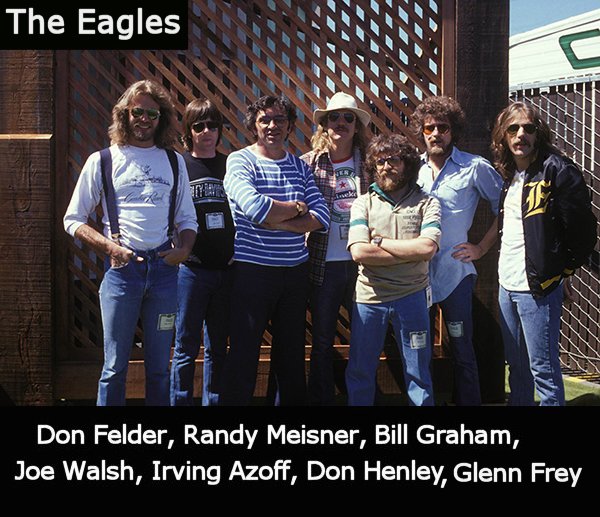



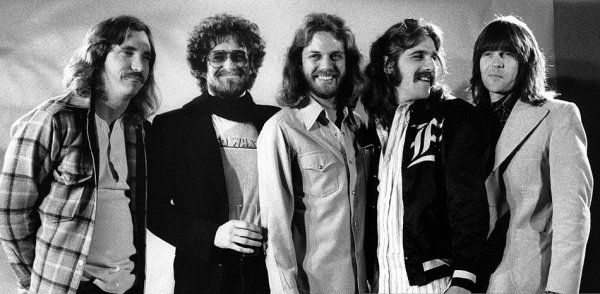
|
SUBCHAPTER 618
-
AN EXAMPLE OF TALENT IN ACTION
|
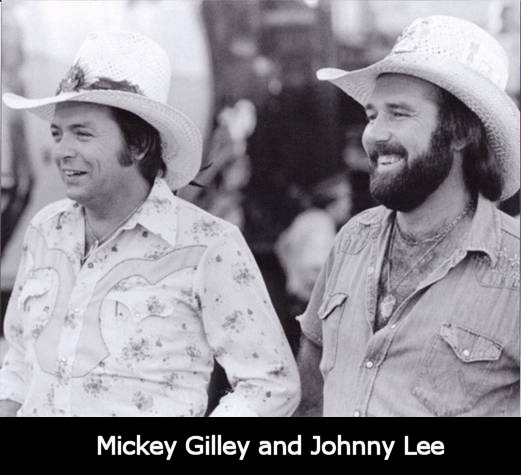 |
Filming on
Urban Cowboy was scheduled to begin at Gilley’s
in May 1979. One night country singer Johnny Lee was
on break when a
stranger approached him. The newcomer was a short, pudgy
Jewish guy. Wearing the wrong kind of clothes
and thick glasses bigger than his face, this little guy stuck
out like a sore thumb here at the rough honky-tonk.
At first glance, Johnny Lee was not impressed.
But he also noticed the man was quite sure of himself.
Identifying himself as the Urban Cowboy
producer, Irving Azoff wasted
no time making his pitch. "Would you be interested in
singing in a movie?"
Accustomed to
being courted by would-be 'managers' and 'I’m-going-to-make-you-a-star'
hustlers, Lee decided to humor the guy. Rolling his
eyes, Lee replied, “Yeah, buddy, sure, whatever, let me know
when,
I'll sing in your movie.”
Johnny Lee's
recording of Lookin’ for Love was released in June 1980. The song
quickly became the breakout hit on the Urban Cowboy
soundtrack. Lookin’ for Love made Lee a
star and stayed on the charts for 37 weeks. The song peaked
at No. 1 on the Billboard Hot Country Singles and No. 5 on
the pop charts. A country-western song high on the pop
charts? Virtually unheard of. What was going on
here?
Country music
would never be the same.
|
Johnny Lee would
later reminisce.
“You have to
understand, people were coming in all the time promising
this, saying that. Azoff came out one night and
heard me do “Cherokee Fiddle” which was a
big hit for me in Houston. He said, “You want to
sing it in a movie?” Well, people were bullshitting me
all the time. So I said, “Yeah, sure, just as soon as I
finish this watermelon. You bet.”
I thought Azoff was just
somebody feeding me a line of baloney. I blew him
off and went on drinking my beer. So when it
actually happened, it freaked me out.
That movie
broadened the audience that listened to country music.
A lot of people started listening to country music and
going to country dance halls that never did before. It
gave country music a shot in the arm. It was a fun time,
and it absolutely was the best thing that ever happened
to me in my life."
So was Azoff's
success an example of Dumb Luck or Talent? I say
Talent. Give Irving
Azoff his credit. He possessed the foresight to see
Robert Stigwood's music maneuver could be applied elsewhere.
Indeed the Urban Cowboy soundtrack became the
fourth best-selling movie album of all time.
Wildly
successful at virtually every stage of his career, in his
later years Irving Azoff would emerge as the
most powerful man in the music industry. Azoff would
often comment that his Urban Cowboy gamble was
the move that sent his career into the stratosphere.
In my opinion, if Irving Azoff had not introduced
the new wave of country music, the impact of
Urban Cowboy on Western music would have
been greatly reduced. Frankly speaking, much of the
'Outlaw Sound' was tough to listen to for
everyone but hard core country types raised on twang and
rockabilly. While there are many purists who will
disagree ('Urban Cowboy ruined country music!'),
Azoff guessed correctly that Country
Rock with its harmonies and intricate lyrics would appeal to a wider audience.
Johnny Lee
recalled, “When Urban Cowboy came along, my
thoughts were, ’If this is a success, this is really going
to slingshot my career. And if it isn’t, it’s going to
shoot me backwards and knock down everything I’d been
working for.’ I didn’t know which way it was going to
go, but I thought it was a pretty big deal having John
Travolta in it. I’m still grateful that John Travolta
put on that cowboy hat and made that movie.”
Johnny Lee was
not the only person to credit John Travolta for the
success of the movie.
Based on
the success of the Saturday Night Fever project, once
John
Travolta committed to the new movie, it didn't take much to
convince the fashion people to jump in. This project signaled a
Western fashion gold mine certain to pay
off in a big way.
Saturday Night Fever had been a surprise hit
to everyone involved. However, with Travolta aboard, Urban Cowboy
would be no surprise. Hyped by Clay Felker as the 'Sequel' to the box
office Disco monster, Urban Cowboy was the safest investment anyone
could imagine.
The music and fashion industry
wasted no time putting their marketing wheels in motion.
|
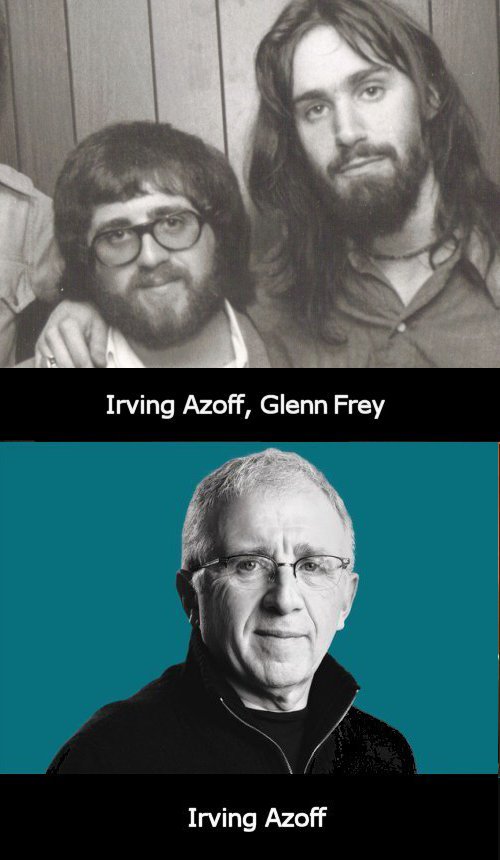 |
SUBCHAPTER 619
- WHAT WAS TRAVOLTA THINKING?
|

SUBCHAPTER 619
- WHAT WAS TRAVOLTA THINKING?
|
Rick Archer's Note:
We
are back in 1979. As I watch the Western Menace slowly
strangle the life out of Disco like a powerful boa
constrictor, I am absolutely certain the only
reason Urban Cowboy ever got off the
launch pad was due to the star power of John
Travolta,
Numero Uno
Cultural Icon of the Seventies.
Overcome with morbid fascination, I wonder how
the muckamucks ever persuaded Travolta to do this
movie. As the brightest star in the constellation,
Travolta is in the enviable position of
choosing his next project.
Money?
Perhaps. But one would think Travolta had enough money to
wait for a better vehicle. Travolta is not right for this
role. He's a tall, skinny kid who comes across as
soft and pretty. Not a scar on his face. One look is all it takes to guess
Travolta has
never thrown a punch in his life. Who is going to believe
this guy is the toughest Hombre at Gilley's?
I rack my brain to understand
what would persuade John Travolta to accept a role in such a
strange Sequel.
|
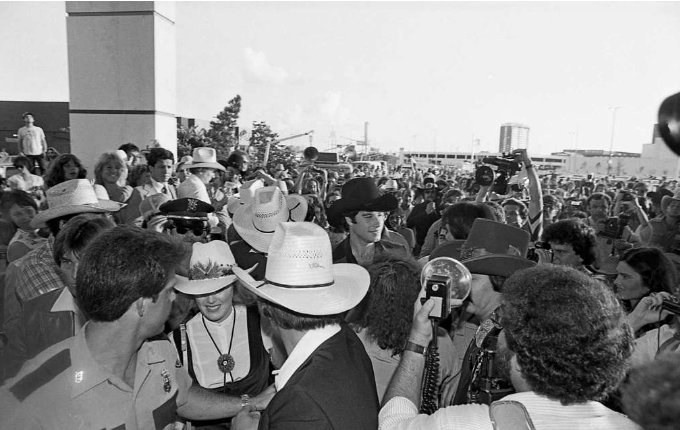 |
What kind of
Sequel is this anyway? A Movie Sequel is supposed to
continue the story of an earlier work. Audiences are
eager for more stories about popular characters. What
will happen to our hero next time? This is what makes
a Sequel so appealing.
What is
Gone with the Wind II without Rhett and Scarlett?
What is King Kong II without King Kong?
What is Godzilla II without Godzilla?
Look at it this way. Godzilla is a major movie star.
He is larger than life, by far the biggest movie star in
Hollywood. Godzilla knows everyone wants to see him
return and kick some more ass. So what is Godzilla's
next move? In his next movie, Godzilla appears as
Barney the Singing and Dancing Dinosaur. Immediately
everyone begins scratching their head. What kind of
career move is this?
|
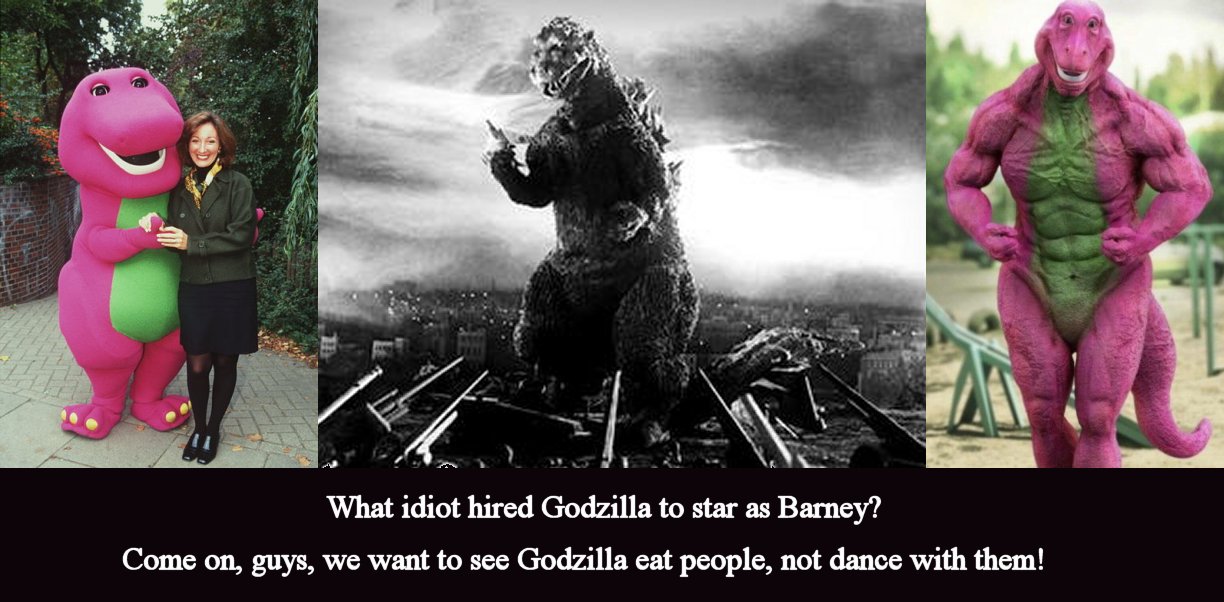
For crying out loud,
John Travolta is the hottest property in Hollywood. With his credibility, Travolta
could snap his fingers and insist
on continuing the Tony Manero Fever story line.
Why not simply demand a Sequel to reprise his Disco role?
None of this adds up.
I finally decide
the answer
is 'Loyalty'. Nothing else makes sense. Since Travolta's name
is involved
and the dancing angle of Urban Cowboy is being
emphasized, I assume the same people who made
Saturday
Night Fever are making Urban Cowboy.
Whoever hired Travolta to do Saturday Night Fever
and Grease had made him a huge star.
So I imagine
they have asked him to do this goofy 'Sequel' as a favor and Travolta
said okay.
I was comforted by the fact that a lot of my
friends reached the same conclusion. Trust me, during
the Dying Days of Disco, we talked endlessly about the
mysteries of Urban Cowboy as we cried in our beers. Still, no matter how
much beer I drink to drown my sorrows, there is
one issue I cannot resolve to my satisfaction...
why
are the muckamucks calling this movie a 'Sequel'?
'Sequel' to what? Every time I read about the movie in the newspaper, they are
calling it a Sequel to Saturday Night Fever. Why not just advertise it as a normal movie starring
Travolta like they did with Grease?
What
makes this a Sequel?
My idea of a Sequel would
feature Travolta reprising his Tony Manero role. That
role had made Travolta famous beyond his wildest dreams.
So why not do it again? The utter absurdity of making a
Sequel that is not a Sequel blows my mind.
|
SUBCHAPTER 620
- THE SEQUEL THAT WAS NOT A SEQUEL
|
Rick Archer's Note:
It took me 37 years
to figure out what was really going on, but it was worth the
wait.
As the Texas
Monthly article made clear, Clay Felker, the guy who
conjured up
Urban Cowboy, had absolutely no connection to John
Travolta. Nor did he have any connection to Robert
Stigwood, the
guy who made Saturday
Night Fever. The only link between Saturday Night Fever and
Urban Cowboy
was John Travolta. All Felker had to do was point at
Travolta and fool
the world into
thinking the movies were connected. Guess what?
It worked! We were fooled. Maybe
even me.
|
Clay Felker was
a sly fellow. Back when he decided to rip off the
Saturday Night Fever plot and transfer it to
Gilley's,
Felker could not legally come right out and say 'Sequel'.
However, Felker found an effective way to convey the message
nonetheless.
The subtitle to Aaron Latham's Esquire story said it
all:
'Saturday
Night Fever, Country-Western Style'
Clay Felker wasn't
interested in subtlety. Felker
intended to link this
story
to Fever from the start.
He was going to make sure every reader of the Urban Cowboy
tale had the 'Sequel'
concept firmly emblazoned in
their brain.
It worked on me and it worked on a lot of other people as
well, including certain Movie Moguls.
|
 |
Keep
this in mind. The advertising campaign did not
call Urban Cowboy a Sequel. That
would have invited a lawsuit. It was the media
that called it a Sequel. My guess is that Clay
Felker referred to Urban Cowboy as a
sequel in phone conversations and casual interviews,
but had the sense not to put it writing. The
gushing TV personalities would then pass on the
rumor wink wink.
Without
John Travolta, this trick would have never worked. To me, the presence of
John Travolta was the ONLY THING that made
Urban Cowboy
a 'Sequel' to Fever. Take
Travolta out of it, who
would go to see this flick?
Although my friends and
I were dumbfounded to understand why brilliant movie moguls would choose
a Country-Western theme over Disco
for the Disco Icon's next starring role, once we
heard that Travolta was involved, we numbly accepted
the weird 'Sequel Rumor' must be legitimate.
Seriously, Travolta's presence was the
only reason we were fooled us into believing this 'Sequel'
bullshit was on the level.
Eventually our doubts went away. Once we
saw all the fuss stirred up by John Travolta filming
a movie in our hometown, we concluded those Hollywood
people were pretty darn smart after all. Those movie
people were so clever they had the sense to know that hiring John
Travolta over the objections of the country purists would guarantee the project's success.
Clearly they had the brains to know city folk were
their target audience and that using Travolta was the
only possible way to reach them.
|
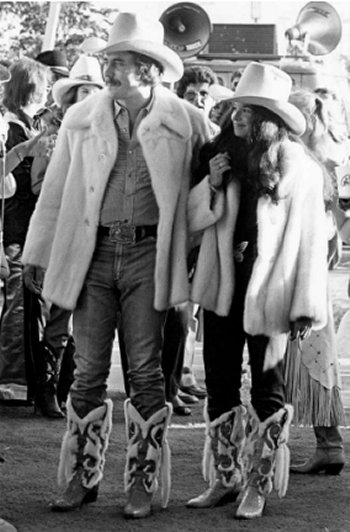 |
Personally, I was
humbled by the man's star power. A lot of
my dance student friends told me they would never dream of
going to see this movie
if Travolta had not been in it. However, now their curiosity was
out of control. Thanks to the media buzz, the entire
city of Houston anticipated Travolta would do the same thing for Western dancing
that he had done for Disco.
Holy Smokes,
this guy was
worth every cent they paid him! I could not
turn sideways without someone talking about 'John'.
Oh, 'John' is so special! Every day another female
TV
personality made a fool of herself gushing over
how handsome 'John' was. Or I would read some smarming
'John' story in the gossip column. His face was
on every billboard.
Talk about
charisma! Well before the
movie was released, Travolta's name and face were already selling
clothes and soundtrack albums like crazy.
Nightclub businessmen
throughout Houston were gambling small fortunes on the
potential of a Travolta-inspired Western
craze. Nor was Travolta's effect limited to Houston.
Travolta went national! John Travolta was a marketing
franchise who singlehandedly inspired a shift to Western
culture in 1979-1980.
As if by magic,
cowboy hats and cowboy boots were showing up on Wall Street,
in Times Square, on yachts at Cape Cod, in BMW's speeding
down Sunset Boulevard. Three piece suits were replaced
with Wrangler Jeans and open collar cowboy shirts. The
chic martini set put aside their gin and ordered themselves
a Lone Star beer just to prove they were Real Cowboys at
heart. Yee haw!
Here in Houston,
grown men
and women took complete leave of their senses and
paraded around the city with unabashed pride in their
outlandish country costumes. Some of the weirdest
outfits I have ever seen appeared with startling regularity
in random places such as grocery stores, movie
theaters and restaurants.
These
developments convinced
me that signing
John Travolta to do this movie was an act of sheer genius!
This opinion remained unchanged for the next
thirty seven
years.
|
SUBCHAPTER 621 -
TYPECASTING
|
Rick Archer's Note:
It is time to discuss Typecasting.
Before we begin, keep in mind everything I
say is hypothetical speculation. It
would be difficult for me, a complete
stranger, to call up Paramount Pictures and
get a candid answer to my questions 40 years
after the fact. So I made some guesses
instead. Please take everything I say
with a grain of salt.
What is Typecasting?
• Cowboy and soldier.
John Wayne.
• Wise old man.
Morgan Freeman, Martin Sheen.
• Action hero. Arnold
Schwarzenegger, The Rock.
• Badass. Samuel
Jackson, Scott Glenn.
• Smarmy foreign guy in film
noir thrillers. Peter Lorre.
• Crazy psychotic.
Christopher Walken.
• Romantic female comedy star.
Jennifer Aniston, Cameron Diaz.
• Sophisticated Romantic male
comedy star. Hugh Grant, Cary
Grant.
• Dancing. Fred Astaire,
John Travolta.
|
What is Reverse Typecasting?
John Travolta, Urban Cowboy.
We are getting closer to the heart of my Dumb Luck story.
John Travolta really had no business starring in Urban
Cowboy.
In fact, according to
the Texas Monthly article, the producers deliberately ruled
Travolta out.
•
Jack Larson,
Urban Cowboy Producer: "Director Jim Bridges
hadn’t even thought of John; his first thought was Dennis
Quaid."
•
Aaron Latham, Writer:
"I thought it was crazy, a big mistake."
•
Dew Westbrook,
Gilley's Romeo: "I told Jim Bridges and Paramount
Pictures that I didn’t think Travolta oughta play me.
Too disco."
Yes, it's true, the producers did not want him!!
Behind the scenes, the Suits were determined
to avoid Travolta at all costs. They were convinced he
was wrong for the part. And you know what? They
had a good point.
This was a movie about
country people who moved to
Houston and Pasadena from rural Texas. Travolta's hiring
risked alienating the very people he was supposed to attract.
Didn't anybody know that John Travolta was despised by most Country
folk?
When
Travolta was hired to film Urban Cowboy, he was
currently Public Enemy Number One thanks to the 'Disco Sucks'
backlash. In particular the Country Crowd hated 'John Ravolta'
with a purple passion for making trashy Disco so disgustingly
popular.
Believe it
or not, none of the Moguls wanted Travolta! Why would they want to hire a
wise-cracking Italian grease ball with a Jersey accent
to play a tough Texas boy? That would be
almost as stupid as hiring Rock Hudson to play the son of
Indian chief
Cochise (true story). How on earth would audiences ever accept the Disco
King as the Dancing Cowboy?
Except for one thing... John Travolta was the Number
One movie star on the planet. Didn't that count for
something?
|
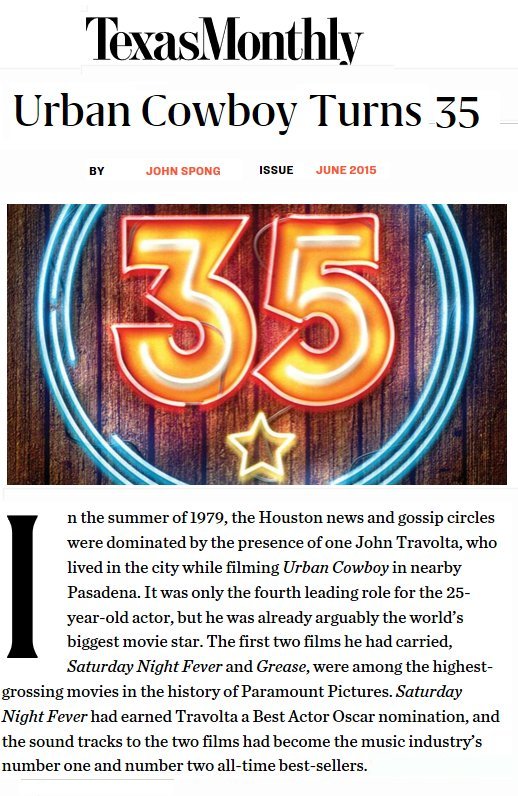 |
SUBCHAPTER 622 -
JOHN TRAVOLTA SAVES URBAN COWBOY
|
Rick Archer's Note:
On a personal
note, the one
thing I never could reconcile was the appearance of John
Travolta as the Dancing Cowboy. The word 'Sequel' is what tripped me up.
What kind of SEQUEL is this? Based on the rumors, I
assumed 'Tony Manero', the Disco King
from SNF, had moved to Texas. Weird plot, but
okay. But then I heard Travolta was playing someone named 'Bud'.
Now I was really confused. If
Urban Cowboy was a true SEQUEL to
Saturday Night Fever,
then why wasn't the star named 'Tony Manero'? I obsessed
over this riddle night and day, but there were no answers.
My instincts
said that something weird was going on here. In a
Sequel, you don't have a star playing a different character.
But here in Houston we were being given the strong
impression that
Urban Cowboy
and Saturday Night Fever
were somehow linked. The only thing that linked the
two movies was John Travolta. Therefore, it was the presence of
John Travolta
that gave the rumor credibility.
Surely Travolta had been hired to do for Western
dancing what he had been hired to do for Disco
dancing. Everyone in Houston
was convinced the presence of Travolta guaranteed that
Western dancing would be the next big thing.
Many people
agreed the only thing that saved Urban Cowboy was the casting of John Travolta.
Country singer Johnny
Lee said it best.
"I thought it was a pretty big deal having Travolta in
it. I am still grateful John Travolta put on that
cowboy hat and made that movie."
In my opinion,
Johnny Lee was
absolutely right. Without
Travolta, I think the movie would have been a giant flop.
Back in the beginning, I was very skeptical about casting
Travolta in this role, but I became a convert.
Let me explain why I
think John Travolta was indispensable. To begin with,
as I have made clear, Urban Cowboy was
shamelessly billed as a
'Sequel' to
Saturday Night Fever. The only thing that
could have possibly sold this Sequel nonsense to the public
was John Travolta. Therefore Clay Felker was very
fortunate to land Travolta. Without Travolta, how on
earth would Felker ever gotten away with his nutty 'Sequel'
claim?
Throughout 1979, I could see
my fellow citizens going bonkers over the fact that John
Travolta was here in town. The presence of John
Travolta absolutely ignited Houston.
My first inkling of Travolta's power came when all the
Discos closed and reopened as Country-Western clubs.
My second inkling came when the Jewish ladies at the
Meyerland Club showed up wearing those preposterous
western outfits. I asked myself who had the power to
make all these women lose complete control of their better
judgment?
|
My third inkling
came in January 1980. This is when my dance program
benefitted from a transfusion of new western students.
Every single one of my new country-western dance students
went on and on about John Travolta. All they could
talk about was "John Travolta this, John Travolta
that, John Travolta is going to put country dancing on the map."
It had taken me
a while to catch on, but now I was convinced this unorthodox move
had paid off for everyone
concerned. I now
realized the casting of John Travolta
as the lead in Urban Cowboy
was a truly inspired choice, a no-brainer. Listening to my
students gush, I shook my head in disbelief. 'My
students are right, but I wonder how did the producers ever
talked John Travolta into appearing in this movie?'
The answer to
that question is the reason I wrote this article in the
first place. We will get to it shortly. In the
meantime, everyone said this movie would be doomed without
Travolta. I completely agreed with them. His
inclusion was the only reason most of us were interested.
Like I keep saying, John Travolta was the hottest movie star on the
planet. Travolta was coming off of Grease, a mega-hit. He had an Oscar nomination for
Saturday Night Fever. Everyone I talked to agreed the master stroke was
lining up John Travolta to do this movie. History bears this
out.
|
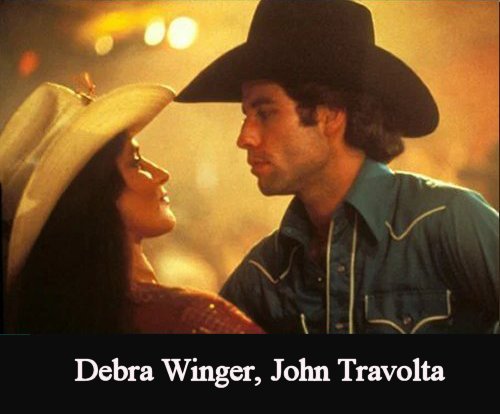 |
With the
advantage of hindsight, we know Urban Cowboy
turned out to be a bad movie. Lame,
predictable script. The professional
critics didn't care for the movie and neither
did I.
Feel
free to disagree, but that's the way I
see it.
Fortunately for the producers, the movie made good
money in spite of its ho-hum, by-the-numbers plotline.
On a $10 million dollar
investment, Urban Cowboy
made good money...
$50 million box office, $30 million record sales.
From my viewpoint, this success
could be attributed to one thing and one thing
only... the dominating presence of John Travolta.
If ever there was
a movie that would have stood little chance of
success without its
star, that would be Urban Cowboy.
Since the thought of seeing Travolta dance again was
irresistible, his
presence sold this movie in advance. Word of mouth was not
necessary. Hyped as a 'SEQUEL', the intense pre-movie hype did
the trick instead.
Knowing now what I did
not know then, I suspect that Clay Felker, the Wizard of Oz himself,
was using his universal media
connections to endlessly plug the movie.
Indeed, here in Houston the days leading up to this movie were
filled with ubiquitous TV features. One feature covered a night at a Texas cowboy bar.
Another feature showed gang of Gilley-rats who devoted their entire
life around being extras in the movie.
There
were
newspaper
'Lifestyle'
articles on suburban
'Cowgirl' fashions.
There were constant media references to the likelihood of western dancing
catching on. Here
in Houston, you could not turn sidewise and not run
into some sort of reminder that the biggest thing
since Davy Crockett, the Alamo and the Astrodome was right around the corner.
Urban Cowboy was a Texas-size
Big Deal. It was so big the movie could not fail because the
pre-game hype was so overpowering.
At the
very center of this whirlwind storm of publicity
stood the Dancing Cowboy himself, John Travolta.
John Travolta is the man who sold this movie. Take my word for
it.
That is the moment I
concluded the Urban Cowboy producers had been really
smart to get Travolta. I was embarrassed at how wrong I had
been wrong to question their decision. Sure, putting Travolta
in this role was reverse typecasting, but I had underestimated his
hold on America's imagination. Obviously someone had known
what they were doing. I decided that is why they were getting
paid the big bucks and not me.
|
 |
Just for
the fun of it, I tried to visualize the thinking
process that had gone into the controversial
selection of Travolta for this part. In my
mind, I pretended to be a Paramount Movie
Mogul making a casting decision on this Urban Cowboy
vehicle my company is interested in financing.
As everyone
knows, movie moguls are very bright guys.
I have earned my job because I always
know what I am doing. I am well aware
that movies cost a lot of money so my job is to make
sensible decisions in a risk-filled business. I understand that one really
bad mistake can bankrupt a studio.
Indeed, there
is so little room for failure that one bad movie could end
my career as a producer. Therefore I am
ultra-conscious to minimize risk. Unfortunately
I have found it is not easy to predict winners and losers.
Some movies have a surprising chemistry...
Saturday Night Fever for example... and some
have no chemistry at all... Sgt. Pepper's
Lonely Hearts Club Band.
So how does a Movie Mogul like
me decide
which movie is a sound investment? I
hedge my bet! If there is one word that
makes Moguls like me tremble with excitement, it is the word
'SEQUEL'. If you say it the right way, 'Sequel'
and 'Squeal' are virtually the same. A
Sequel makes a movie mogul Squeal with delight. A Sequel is movie magic.
"Ooh, baby, baby,
b-b-baby baby, I just love dem Sequels!"
'SEQUEL'
is the movie
industry's favorite word because it guarantees a built-in audience.
'Sequels' are the safest bet in
Hollywood, especially if the star is willing
to return. A perfect example would
be the countless James Bond movies. Think about the James
Bond movies with Sean Connery. It was never the same without
him, was it?
Nor would a SEQUEL to Saturday Night Fever be
any good without John Travolta.
Right now I am
sitting with other sharp
Paramount executives in our plush Hollywood office. We
are staring at the Urban
Cowboy script. It is a tale about displaced country
yahoos forced
to work in smelly Pasadena oil refineries. Unattractive people, no
nudity, ugly location. And yet Clay Felker is sitting
here insisting
this is a SEQUEL to Saturday Night Fever.
I shake my head. This guy must be out of his mind.
|
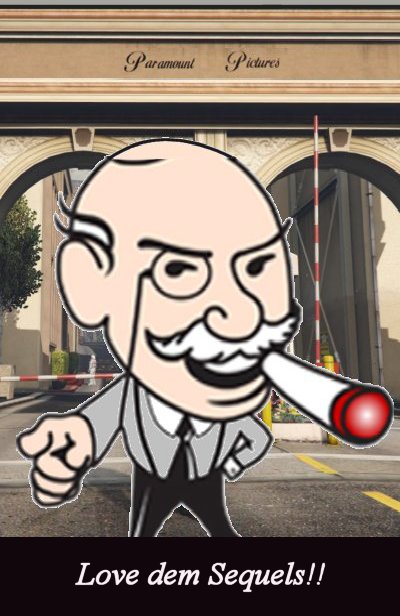 |
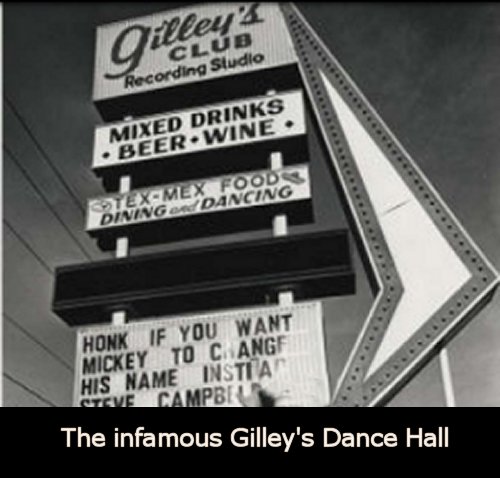 |
As a Mogul, I
have a major problem. This here Gilley's
place is the focus for most of the
movie's events. From what I gather, Gilley's
is not attractive.
It has been described to me as a hot, sticky, beer-drenched dump.
I have also been told
the people who hang out at
Gilley's
are not easy on the eyes. My colleagues refer
to them as 'Redneck Rodeo'.
We aren't talking about cute Rednecks like Daisy
Duke on the
Dukes of
Hazzard TV show. Nope. My
comrades
are talking about angry, bigoted people who flirt
with Klu Klux Klan membership and beat their wives.
They are talking about
nasty bullies who think getting drunk and fighting
on the premises is the very finest
in Saturday night
entertainment.
So I ask a
question. Is there any way we can make this movie more
like Dallas? Can we get Larry Hagman to
play Bud? Rich, conniving oil barons and their
beautiful trophy wives make it happen for Dallas.
Therefore it is a serious reach to expect brawling,
beer-bellied rednecks and foul-mouthed women
with plus-sized butts to achieve a
similar fascination. I've got some pictures in front
of me. The way I see it, whoever
said Country is Cool has not been to
Gilley's lately.
Therefore I have
to hand it to Clay Felker. As
we Moguls listen to his pitch here in our Mogul office, Felker's
bullshit makes
this run-down honky-tonk
sound like the second coming of Xanadu. Don't ask me
how he did it, but
Felker threw Ugly
into his spin machine and made
Badass
sound beautiful.
|
However, we Movie
Moguls are not stupid. We know better than to
believe a con artist like Clay Felker.
No amount of
lipstick on this pig will sell this movie. So we decide to accept this
project only on one condition. We have to get
John Travolta!
Otherwise no one will ever believe this is a
SEQUEL. The only way this movie will ever make us a
dime is if John Travolta is willing to star in this movie!!!
Let's go get him!
|
SUBCHAPTER 623 - THE
DUMB LUCKIEST GUYS OF ALL TIME
|
Rick Archer's Note:
Since
John Travolta ended up starring in the movie, I
think we can assume the Paramount moguls came to
their senses and pulled out all stops to Travolta
well in advance. These muckamucks obviously
knew what they were doing after all.
|
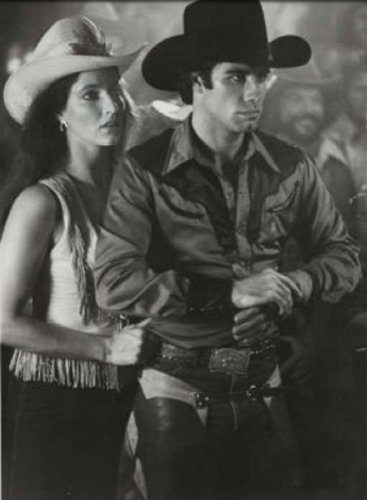 |
But what if the
producers did not know what
they were doing?
I was 66
years old when I read the 'Urban
Cowboy Turns 35' article. When I
discovered the true story, my jaw
dropped open in shock. The
article said the
mogul muckamucks
never had any intention of asking Travolta to star in the
movie. Not once did they bother to ask
Travolta if he was interested.
Unbelievable!!! I had just spent the past 40
years thinking these guys were geniuses, but
nothing could be further from the truth.
These movie
moguls weren't brilliant at all,
they were just ridiculously lucky! Or
should I say 'Dumb Lucky'? The whole Travolta thing was
based on unbelievable
Dumb Luck!!!
Surely
the Reader assumes I am joking. Right now you
are saying, "Gosh, Rick, are you serious when you
say they didn't ask John Travolta to do this movie?"
Yes,
folks, that is correct. Prepare to be
outrageously amused. These
movie guys
were not smart, at least not when it came to this
movie. They were the Dumb Luckiest
movie moguls in Hollywood History. Let's
face it, sometimes it
is better to be lucky than smart. As it
turned out, the people who were planning to make
Urban Cowboy did not ask John Travolta to participate in this
movie because he was obviously wrong for the part.
That makes sense. As I have pointed out, on paper, Travolta was an
odd choice.
So now
you wonder how John Travolta ended up starring in
Urban Cowboy even though no one wanted him there
to begin with. The answer is fascinating to
say the least.
|
SUBCHAPTER 624
- A QUIRK OF FATE
|
To make
a long story short, John Travolta had to beg the Moguls to let
him be in this movie. This is hard
to believe, but it is true.
It all
went back to the contract Travolta signed with
Robert Stigwood. The contract called for
Travolta to do three movies.
-
Saturday
Night Fever
-
Grease
- And, uh,
yeah, that third blockbuster.
Out of
curiosity, can you name
John Travolta's third Stigwood movie? If
you are stumped, don't feel bad. I drew a
compete blank and I bet you will too. The odds
of getting it right are slim and none. But if
you succeed, then I definitely want you on my Movie
Trivia team.
One
reason no one remembers Travolta's third Stigwood movie is because apparently no one
ever saw it. Well, maybe a few people saw it, but they won't
admit it. Okay, you either know the answer or
you've finished looking it up on Google, so let's get to it.
|
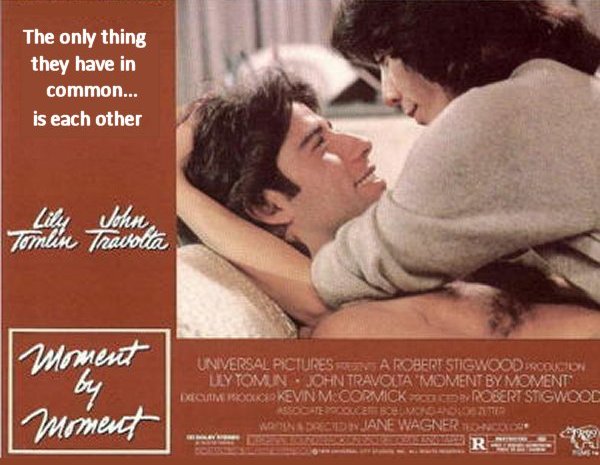 |
Moment by
Moment
(1978) with Lily Tomlin was Travolta's third
Stigwood movie. This movie was an unmitigated flop.
'The
only thing they have in common is each other.'
What utter
nonsense.
They had
NOTHING IN COMMON. Any two people off the street reading
lines from the script would have been more effective. Cast as a 'May-December'
romance, Tomlin and Travolta were mismatched stars
from the start. They had the worst chemistry
in cinematic history. Tomlin did not click at
all as Travolta's cougar girlfriend. No
sizzle, just fizzle.
However, the
thing that catapulted this flick from mere flop to
catastrophic failure was an unanticipated bad break.
Lily Tomlin bore an uncanny resemblance to Travolta
in both facial structure and body type. Making
matters worse, their matching hair styles made the
weird resemblance impossible to miss.
On screen,
Tomlin looked more like Travolta's mother than his
girlfriend.
It did not help that Tomlin was 16 years older, thus
making the mother-son connection a biological
possibility.
The moment
their icky hot tub scene screamed 'Incest!',
everyone in the theater got a bad case of the
heebie-jeebies. The movie was so creepy,
droves of people got up and left.
|

The Travolta-Tomlin
resemblance was so obvious, one would think the director or
someone would have noticed during the filming. Or more
likely everyone had the sense to look the other way, sort of
like 'The Emperor's New Clothes'. For crying out loud,
will someone give Travolta a crew cut or stick a blonde wig on
Tomlin? Either Travolta
was guilty of seducing his mother or he was having sex with his older sister.
Either way, the sex scenes were unbearable to watch.
The bad news was that
no one went to see this movie. The good news
was that no one went to see this movie. The
movie was pulled from theaters as fast as humanly possible,
but the ensuing criticism drove Travolta to madness. Although
his star
power survived due to the movie's
anonymity, his ego was
seriously damaged by the withering negativity. Many years later, Travolta
was asked to comment on the Moment by
Moment fiasco.
|
 |
Interview Question:
"John, Saturday
Night Fever turned you into a cultural icon. What
was your reaction to the impact of Moment by Moment?”
Travolta:
"I
think with Fever, people were evaluating my impact
more than they were my acting. As for Moment by Moment,
my God, you would have thought I had committed murder or
something! It was serious trouble.
And
the weird thing was that everything in my life up to that
point, well, I don’t know of a career that had gone more
smoothly and successfully than mine. Welcome Back
Kotter, Carrie, Boy in the Plastic Bubble, Saturday Night Fever and
Grease - they were five major strokes that were 100
percent all right.
Unfortunately, at the very peak, when the lights were on
full and everybody was watching and waiting, here comes Moment by
Moment. Boom. Failure! And not just ordinary
failure, but gut-wrenching, horrible failure. I cringe every time I think about it."
|
After
Moment by Moment, one would
assume Travolta would lick his wounds, dust himself
off and get ready to begin filming Urban Cowboy.
After all, we can assume the muckamucks had the sense to
lock Mr. Indispensable up
contractually. However, such was not the case. Travolta had no idea
Urban
Cowboy even existed. His next film was
American Gigolo.
American Gigolo? You mean the Richard Gere movie? It turns out that John Travolta was
contractually obligated to film American Gigolo.
This raises a fascinating question, one for which I have no
answer. How on earth did
Clay Felker intend to sell the Sequel idea without John
Travolta playing the lead? The only way
Felker's rip-off could
successfully hop onto Stigwood's coattails would be to link
it to Saturday Night Fever. Felker and
Paramount needed Travolta for that. There was no other
way. Therefore ordinary
people like you and me would can see Paramount needed to lock
Travolta up ahead of time to prevent Stigwood
interference. Since these Moguls were really
smart guys, we can assume they already had this angle
figured out. Leaving nothing to chance,
surely the geniuses who bought the film rights had
Travolta signed, sealed
and delivered for Urban Cowboy well in advance.
That, of course, would be the obvious conclusion.
However, we now know it
is the wrong conclusion. They did not have the
sense to do that. Travolta was
definitely headed to American Gigolo.
Should Paramount
have contacted Travolta? YES!! And did the
Producers do that? NO!! They never once
contacted him which was very risky. The
moment Robert Stigwood discovered that Felker was trying to
steal the 'Sequel' concept,
he would
probably tell his attorney to dissuade Travolta from participating. In Stigwood's mind, the only thing
that could make Felker's copycat maneuver worse would be if the
Urban Cowboy
producers went out and hired John Travolta to play
the lead.
|
So let's try to
guess what happened next. Here's an idea. Since
Paramount owned the rights to both movies, some Paramount
Mogul must have pleaded with another Paramount Mogul
to trade John Travolta to Urban Cowboy in
return for Richard Gere and a Mickey Mantle baseball card because
they had to have Travolta. But
that is not what happened.
As it turned out, the smartest guys in the room decided John
Travolta was completely wrong for the role. Instead they lined up
Houston-born actor Dennis Quaid to play the role of Bud.
Aaron Latham had written the Urban Cowboy
script with Quaid specifically in mind. I imagine Dennis Quaid would have
been good for the role. Unlike pretty boy John, Quaid had a
tough, rugged look that suggested he had actually thrown
a punch or two at some point in his life.
Meanwhile Travolta had
no idea he had been overlooked for the part. All he
could think about was his Moment to Moment
failure, the first black mark in his career.
Badly shaken by the scathing criticism surrounding his
recent movie, Travolta experienced tremendous self-doubt.
Reeling from his Moment to
Moment failure, Travolta wanted
nothing to do with his next picture, American Gigolo.
He decided to ditch the movie because it
reminded him too much of the effeminate pretty boy role in his recent failure.
Travolta preferred a more masculine role, so the part went to Richard Gere.
Paramount Pictures was
producing American Gigolo. They
said Travolta could withdraw if he wanted to, but only
if he would agree to make two films for them instead of one.
Paramount told Travolta to study some of the other
films in production and see which one he liked. By coincidence, Paramount had just agreed to film
Urban Cowboy at the same exact moment Travolta
withdrew from Gigolo. In other words, John Travolta had just become available at the
exact moment casting for Urban Cowboy had begun.
Nice timing. In fact, it sounds rather Fateful,
doesn't it?
|
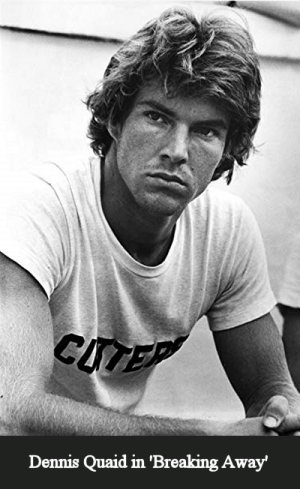 |
Through the grapevine, Travolta heard
Urban
Cowboy had dancing in it and that casting
for the movie was taking place right this minute.
Curious, he asked a friend
for a copy of the script. After reading the script, Travolta wanted to do the
movie. In hindsight,
given the details of his Moment to
Moment failure, Travolta's decision to chase this script
makes sense. Following the criticism for
being passive and effeminate in his previous role, Travolta
was understandably drawn to the macho role of a tough Texas cowboy.
In Travolta's own words:
"Shortly after Moment by Moment, I read
the script for Urban Cowboy. I wanted to
check out Gilley’s and the mechanical bull. It seemed
like something new to me, with a rough element that made
it exciting. The bull riding, the dancing, the dangerous
atmosphere — it had all the right elements. It was a
one-shot project and I made my own decision, took my own
risk.”
Obviously the dancing interested Travolta. As the star of the two most popular dance
movies since the days of Fred Astaire and Ginger Rogers, Travolta was no doubt
drawn to a situation that promised to restore his damaged
confidence. So Travolta took the unusual step of
calling director Jim Bridges to lobby for the part.
Director Bridges was not very encouraging. Without
explaining his reluctance to Travolta, he was totally locked into Dennis Quaid. Bridges
told Travolta he would talk it over with writer Aaron Latham and the
producers to see what they thought. They thought the
idea of hiring Travolta was ridiculous.
Jim
Bridges got back on the phone and told Travolta not to
bother, Dennis Quaid had
already been promised the spot.
Undeterred, Travolta insisted on an audition. Bridges
didn't know what to say. The Urban Cowboy
brain trust were all of one mind... they were convinced that Dennis Quaid,
the
rawboned native Texan, was right for the role. They
were equally convinced that Travolta, the
Jersey kid with a thick East Coast accent, was a big
mistake. On the other hand,
riding his considerable Saturday Night Fever
and Grease fame, John Travolta did occupy the Center of
Cinema Universe. Apparently that small detail was
enough to get him an
audition.
It is a
well-known fact that A-list Hollywood Gods and Goddesses do not have to
read for anything. Their previous work speaks for
itself. Nevertheless Travolta was humble enough to
give it a try. First of all, he did something very
clever... he practiced in advance for his audition!
In his own
words:
"Right
away I went to Texas to rub elbows with cowboys, real
and urban, and it was a revelation. I was used to
New York and L.A., where people looked over each other’s
shoulders at parties for someone more interesting to
talk to. These Texans just wanted to have a beer,
a whiskey, and a fantastic time. I spent a good
month hanging out with them, and another training at my
ranch in Santa Barbara, where I’d installed a mechanical
bull and a dance floor."
Buying his own ticket, Travolta hopped on a plane and flew from California to
chase the part. To begin with, apparently Travolta had
more guts than people gave him credit for. He was the
best mechanical bull rider in the cast. In addition, to everyone's surprise, Travolta
turned out to be a kicker at heart. Little did they
know that Travolta had always fancied himself a cowboy.
Even before the movie, Travolta wore
boots wherever he went, drove a pickup truck and loved
Westerns. Practicing his southern drawl beforehand,
Travolta swept the producer, writer and director off their feet.
"Howdy, y'all!! I'm
right darn tootin'
glad to be here tooo-day. Got my boots on and
I'm cowboyed up 'bout dancin' and kickin'
some ass in this here movie! Now do me a favor and
show me where this cotton-pickin' mechanical bull is
hidin'!"
Let me say
this one more time: Although John Travolta,
supernova supreme, was the only
thing that could have possibly turned this likely flop
into a money maker, the movie muckamucks never once asked
if he was interested. Then Fate intervened and
gave the Mucks a second chance.
Due to
a Quirk of Fate regarding Gigolo, John Travolta was not only
available, he was very interested.
So what did the
muckamucks do with their second chance? The most brilliant minds in
Hollywood yawned and said don't bother. We've got Dennis Quaid
lined up, so who needs you? After being told
he was wrong for the part, Travolta, the
hottest star on the planet, was
forced to BEG for an audition. Once Travolta
insisted, the muckamucks finally relented and gave him
lukewarm permission to fly to Houston and try out for
the part.
Thanks to the most serious case of Dumb Luck imaginable, the
movie would rake in $50 million on a budget of $10 million.
And only God knows how many weird western outfits and
cowboy soundtrack albums were sold strictly because Travolta was
the star. No doubt the Paramount Moguls had the nerve to
take credit for their 'brilliant' casting decision. However, in their
heart of hearts,
they had to wonder how on earth they were ever lucky enough to
get the hottest star on the planet to appear in this movie
and why they had discouraged him in the first place.
Can you believe those Muckamucks made JOHN TRAVOLTA
crawl
for an audition!?!?!
Seriously, this story belongs in
Ripley's Believe it or Not. That's the thing about success.
Sometimes we succeed because we have talent and we are smart. And
sometimes it is better to be lucky than smart. Just ask me.
As far as I am concerned, my career as a Western
instructor was a complete accident. I should have seen
the potential in Western dancing, but turned my
back. Thanks to Fate, I succeeded in spite of
my own stupidity.
Apparently the same
can be said for the men who made Urban Cowboy.
They not only overlooked the number one star in
Hollywood to begin with, they brushed him off when
Travolta initially showed interest.
Dumb Luck occurs when someone succeeds despite
colossal stupidity.
|
|
|